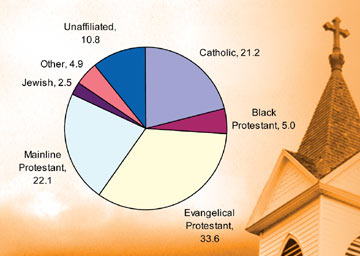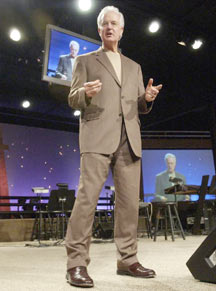Bill hinders suits over violations of church-state separation
Posted: 10/03/06
Bill hinders suits over violations
of church-state separation
By Robert Marus
ABP Washington Bureau
WASHINGTON (ABP)—After impassioned debate on the separation of church and state Sept. 26, the House of Representatives passed a bill that would make it harder to sue the government for violations of church-state separation.
House members voted 244-173 in favor of H.R. 2679, called by supporters the “Public Expression of Religion Act.” In cases involving the First Amendment’s establishment clause, the proposal would prevent federal courts from requiring government entities to reimburse the legal costs of the individual or group that sued the government agency—even though the agency was found in violation of the constitution.
The establishment clause bars the government from endorsing or inhibiting religious groups or doctrines. Currently, federal judges routinely require the government entity to pay the legal expenses of a plaintiff who successfully asserts an establishment-clause violation.
Supporters contended that the bill would keep special-interest groups such as the American Civil Liberties Union from “abusing the system” when filing challenges to government actions that may endorse religion.
“Too often today, overzealous courts have infringed an individual’s right to worship,” Rep. Phil Gingrey (R-Ga.), a supporter of the measure, said on the House floor. “These attacks on our religious heritage are frivolous.”
But opponents said it would have a chilling effect on the ability of religious minorities to defend their freedoms.
“Mr. Speaker, let’s be clear—there’s nothing benign about this bill. This bill makes it more difficult to enforce the First Amendment to the Constitution and the very words thereof designed to protect the religious freedom of every American,” said Rep. Chet Edwards (D-Texas).
Without such reimbursements, many church-state separationist groups and other civil-rights groups could not afford to file such lawsuits in the first place.
The bill’s chief sponsor, Rep. John Hostettler (R-Ind.), said some such groups file lawsuits and use the threat of hundreds of thousands of dollars in legal fees to pressure municipalities and states into settling before the case reaches court.
“Without that ability for the ACLU and others to go into these closed-door sessions and say to the mayor … we’re going to sue, we’re going to win, and you’re going to have to pay our attorneys’ fees, these cases will go to court,” Hostettler said, referring to the American Civil Liberties Union.
But Rep. Jerrold Nadler (D-N.Y.) asked the bill’s supporters if they would feel the same way about limiting attorneys’ fees in such cases if government agencies were being sued for advancing other religions.
“Let’s assume in some town Sunni Muslims became a majority. And let’s assume that everyone in that town…was forced to recite ‘There is but one God, and Allah is his name,’” he said, quoting Islam’s most common affirmation of faith.
“They think that only the majority religion is ever going to be in the position to dominate the local government or any government. Maybe so, but the whole reason we have the First Amendment is because you can’t be sure.”
Although a companion bill has been introduced in the Senate, that body is virtually certain not to address it before Congress ends its current term.
News of religion, faith, missions, Bible study and Christian ministry among Texas Baptist churches, in the BGCT, the Southern Baptist Convention ( SBC ) and around the world.

